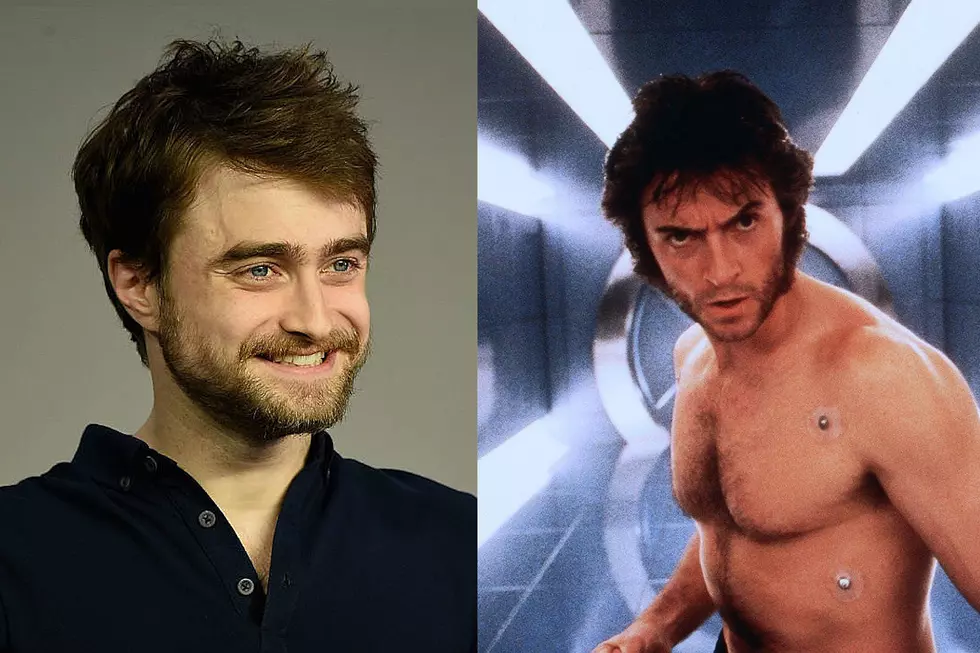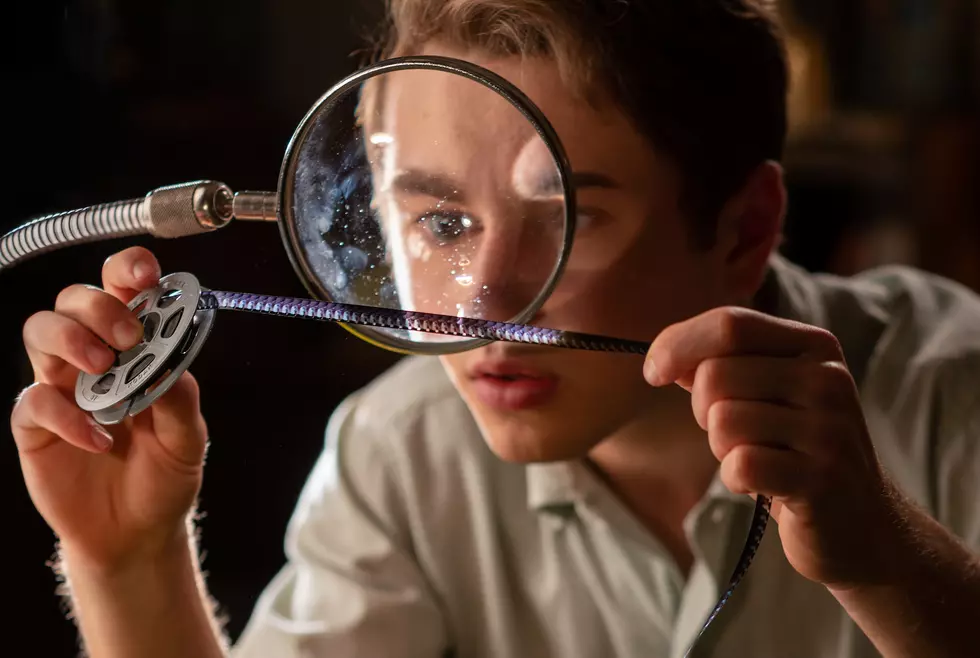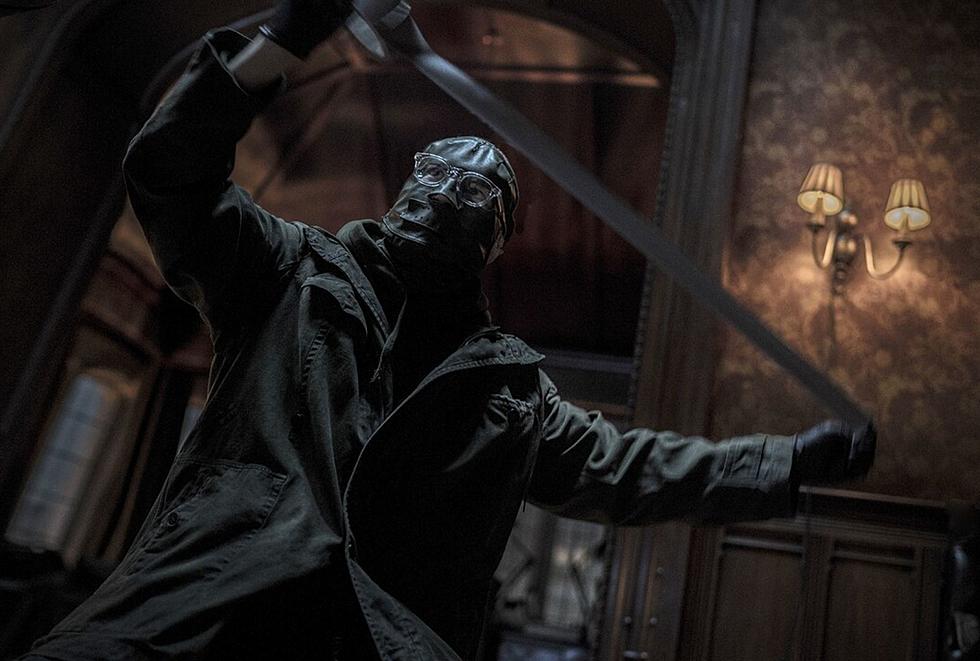
‘Swiss Army Man’ Directors Talk About Finding Meaning and Tears in Fart Jokes
It’s just been a over week since Swiss Army Man shocked Park City audiences at its Sundance world premiere, and the absurdist dramedy is already known as “the Daniel Radcliffe fart movie.” If you’ve seen the headlines and read the reviews (here’s ours), you already know the film prompted some walk-outs after Paul Dano’s Hank rode the back of Radcliffe’s Manny, a farting corpse, like a jet-ski across an ocean. But, like those who left after the hilarious, blissfully weird opening scene, what you don’t know is that filmmakers Dan Kwan and Daniel Scheinert’s Swiss Army Man is actually a meditation on profound, human topics. (A24 has since picked up the film for release and Kwan and Scheinert won Directing Award at Sundance.)
Speaking of meditation, the filmmakers who collectively go by The DANIELS, told me how they meditated on the notion of flatulence while making the film. The results are what Scheinert calls, “a very personal fart drama” that follows Hank and Manny attempting to escape from the wildness to return to civilization and find the girl (Mary Elizabeth Winstead) they both love. Hank discovers and utilizes the magical powers of Manny’s body for survival – his mouth functions like a spout of never-ending water, his erection becomes a compass, his hands work like flint, his teeth like razor-sharp knives, and so much more. But while the comedy of the film may seem like an over-indulgence in potty humor, the repeated focus on the taboos behind farting and as well as masturbation serve as a deeper commentary on the shame we carry around each day.
I sat down virtually over Skype with The DANIELS, and technically a third Daniel when I met one of the four very realistic dead Radcliffe dummy bodies, to talk about the weirdest movie in Sundance history. I learned the filmmakers don’t actually like fart jokes (can you believe it?), that they had serious talks about farts with Quentin Tarantino, and what their moms thought of the movie. What followed was one of the most bizarre, most fun, and most (slightly) disgusting interviews I’ve ever conducted.
I love this film because it’s a viewing experience unlike anything I’ve ever seen. I was constantly thinking, WTF is going on? While writing and making it did you guys every stop and think, What are we doing, this is totally absurd, or did it not even phase you?
Daniel Scheinert: No, we were crippled with self-doubt for –
Dan Kwan: Every single day, basically.
Scheinert: Yeah, for the last few years. But the excitement outweighed the doubt. It kind of kept us motivated to keep trying to make it better. But it was not easy.
Kwan: We actually talked a little bit about this at a Q&A we just came from. The screening went really well, it was the best audience. Someone asked about this and I do think part of the process of making the film is leaning against good judgement. We both know that fart jokes are the worst and we don’t even like them, we don’t even think they’re funny. The whole film is just us breaking down our own prejudices, not just against farts but everything. Everything in this film is filled with things we don’t like. We don’t like a cappella music and the whole score is a cappella. We don’t like musicals, or musicals are a guilty pleasure for [Daniel Scheinert].
Scheinert: It’s filled with guilty pleasures, things that make you laugh and then a minute later you don’t want to admit that they made you laugh.
Kwan: Or like “Cotton Eyed Joe” is the worst song in the world.
Scheinert: Those are the kinds we put into it, things that we’re ashamed of and the question is, “Why?”
Kwan: Yeah, why are we ashamed of all these things. Not only the body stuff, but stuff that comes from the brain. I think one the greatest moments while we were writing was when we discovered that moment where Manny says, “Please don’t tell Sarah how much I loved her.” I think one of the saddest things that someone can be ashamed of, and it happens all the time, is love. Just the fact that you’re attracted to someone and you need someone and that you’re lonely is something people are ashamed of and that’s kind of heartbreaking. For this dead body to experience that for the first time, [it] was really exciting when we discovered that. I think the whole film is about shame and the things we’re ashamed of. We evaluate why we are ashamed of those things and take them back and celebrate them because they are still a part of us. Like fart jokes are the least respectful art form, the least respectful part of any film. We hate Shrek and things like that.
Scheinert: Shrek one is okay.
Kwan: Yeah, the other ones took it a little too far. So to answer your question, yeah, we were miserable and terrified that this was going to be a bad idea, but we kept pushing through it to try and find meaning and purpose to it.
You guys said at the premiere screening that the film began as a fart joke that evolved into bigger ideas. So would you say it started with the humor or with these more profound ideas?
Scheinert: I think what attracts us to a concept for any movie, even our short-form stuff, is if an idea seems like it’ll be worth working on for a while. We don’t go in with a message like, “Oh, I want to say that about life let’s come up with some fictional story that illustrates it so we can preach.”
Scheinert: I think that the endless problem of this film is what kind of kept us going at it. This is not something you could ever solve. Us being like, “How can you make farts meaningful? How can we make body humor something profound?” We had no idea going into it how we would ever do that or how it would exist, but every step of the process we had to rewrite and rethink and re-invent a new problem. Every time we solved something, something else came up and fucked everything up. I think that’s why we chose these projects, because we know we’ll never be able to solve them. Part of the reason is it’s funny to us to tell people it started as a fart joke. To us it’s funny to bring that up because it’s been years since that fart joke made us laugh.
Kwan: It’s not funny at all anymore.
Scheinert: It’s a very personal fart drama now, and it’s kind of sentimental and think back, Oh, remember when it made us laugh and we spent a few years crying?
Kwan: It forced us to meditate on farts for a long time. It’s like when the monks used to take a single passage of scripture and just draw ornately around that one fart. They’d spend like three months on this one page and it’s them meditating on this spot. Just for the fact of working on it for so long, they’re forced to think about it.
Scheinert: Our Om was a fart sound.
Kwan: Exactly.
Scheinert: It’s a pretty rewarding meditation, honestly. We took this through the Sundance Labs in 2014 and the conversations we got to have with brilliant artists about farts, I will take them to my grave. I got to sit and talk to Quentin Tarantino, Ed Harris, Patty Jenkins about farts. And neither of us were laughing. We got real.
Kwan: One little thing we discovered, which I love, and you don’t have to publish this, but for your own edification it’d be good for you to know this. The place where you get your fart smell from is from your mother.
[Kwan gives a very detailed, very NSFW, very gross description of the hereditary history of one’s fart smell that he claims he read about in multiple articles. Look those up for yourself.]
It’s interesting that as you meditated on the idea, it changed into something else. The first reactions to the film we’re a bit controversial and of course people walked out, but now it sounds like audiences are staying to watch it. Do you think it’s a film that, as more time passes, more people will see the meaning behind it?
Scheinert: Yeah. I didn’t realize when I started on my first feature that this would be the movie I watched the most in my whole freaking life. I’m personally so glad that the movie is as dense as it really is because I still enjoy watching it. […] But I also think the walk-outs thing is really interesting. In some ways we’re grateful because we now have a historical headline that we’re responsible for. It’s pretty exciting. But for people we talked to that were there or come to the festival, apparently a lot of premieres have walk-outs because that’s when distributors and agents come take a look and then leave. It really seems like we offended the creative sensibility of a couple critics. And I can’t wait for those critics to see the movie and finish it. I don’t know if they ever will, but they’ll get to the end of the movie and realize they’re a character in our movie. They show up at the end. The point of it being as gross as it is is to explore how society reacts to these gross things.
Kwan: Or the subjectivity of what is good and what is right or is wrong. And who’s the judge of that.
Scheinert: And they might still hate it. But I’m so curious because they didn’t get to the second phase of, “Wait, why are farts so gross?” But they kind of proved the point of our film.
Kwan: The funny thing is we didn’t even notice people leaving, and [it was] like maybe one or two percent of the audience. We made kind of a big risk by making sure no one knew what the movie was really about and kind of tricking all of Sundance into thinking it was a traditional Sundance film, and we basically blindsided the entire audience. If only one or two percent got up and left, that’s kind of a victory even of itself. Now that the reviews are coming out people will see it wasn’t just this thing people hated. To get back to your question, there is a really funny review [where the critic] said in almost like a war of attrition we convinced people to take another look at potty humor. I think there’s such a repetition and an unrelenting push for the scatological that people either are turned off and annoyed, or they can kind of push through it and their brain starts going numb to it. In our film we talk about diminishing returns; they no longer have that same effect. And I think in that no man’s land where they no longer have any meaning we can create new meaning. That was a weird thing we discovered while making this. At first we were shying away from fart stuff and from the scatological humor and all the gross parts of humans and we realized the film wasn’t working. So we had to push really hard, lean into that and make every scene about that. Again, against our own good judgement. You know the phrase semantic satiation? When you say a phrase too many times over again it loses meaning. If I say banana, banana, banana, banana, banana.
Scheinert: Just keep doing it for a few minutes.
Kwan: Banana. Banana. Banana. Banana. Banana.
[The DANIELS want you to know Dan Kwan said “banana” a couple hundred times.]
Kwan: The word loses meaning and it’s exciting for us to almost reprogram and change the circuitry of someone’s brain to just say, “fart, fart, fart, fart, fart, fart, fart, fart.” In this film, and almost in anyone’s life, a fart can be very sincere. I forget where I read it, but it’s like, “A fart is the most honest sound a human can make.” And I really liked that. So I do think repetition is a big part of it and watching it again and being sucked into the world so you can kind of shed all the prejudices and biases you may have towards the subject matter and see something like a child almost. Tonight at the screening there was a 70-year-old woman who came up to me and was like, “I love the movie. It made me feel like I was a child again!” I was like, that’s perfect! We want to throw away all the things that make us self-conscious and have fun and celebrate life using the trash of society so to speak, and [Dano and Radcliffe's characters] literally do that in the film.
I think it’s kind of perfect it premiered at Sundance because it’s such an anti-Sundance movie in many ways. Is this something you’d want to see in other films, where a fixation on the taboo upsets expectations of a typical indie or a drama?
Scheinert: I think that’s our grandest dream. We’re so happy that we got to make the film, but we really hope that people see it and that it makes enough money that more movies like this can get made. We made it because we wanted to see it, and I feel like there’s a missing genre of film right now that I grew up on of stylized, funny but profound movies. In the ‘90s and early 2000s Hollywood was still making really fun, crazy –
Kwan: Pulp Fiction, Fight Club, Amelie, City of God, Eternal Sunshine.
Scheinert: Even The Matrix. Snatch.
Those are all pretty much my favorite movies.
Kwan: Exactly. And those movies are gone right now. No one’s making them. All of our favorite movies right now are the really quite dramas, and they’re amazing and beautiful and they deserve to exist, but I do think people need to be shaken out of what – because now all the big, flashy fun movies are superhero movies and disaster films. Obviously they will always be here. But we’re really proud that this film exists just because it shouldn’t exist in this climate. No one would ever make this movie except for the fact that a couple of idiots pushed it into existence.
Scheinert: I do think that content like this exists in music, in the internet, viral videos, animation and things like Adventure Time, but film doesn’t have it right now. And we have friends that could make it and want to make it.
Kwan: I do like you saying the thing about it premiering at Sundance being important because I think I agree. I don’t think I realized this until now, how important it was this film premiering the way it did. A couple people are saying this should have been a Midnight feature or in the weird section. When I read that I wasn’t sure how I felt and now I’m pretty sure I disagree because I think the reason why we made this film was to just show normal people that they’re weird as well. The target audience is obviously people like ourselves and we’re also just trying to appeal to people like our moms and the people who never want to watch a movie like this.
Scheinert: Because our moms have regular lives with regular jobs, but they’re weird too.
Have your moms seen the movie?
Scheinert: They have.
What’d they think?
Kwan: [Mine] said, “Mostly pretty good, but the music was all good.” Very Asian response.
Scheinert: My mom saw it the second night in Salt Lake. I was worried because we sat down and it was a lot of older folks who came out for the screening. But it was such a warm reception, applause during the film four times and a standing ovation at the end when the actors came out. But she leaned across my girlfriend and was like, “Daniel, I loved it!“ and she started crying. Then my girlfriend started bawling because my mom was crying and I was trying to not cry before the Q&A.
Kwan: It’s been really strange because I think for every person who walks out, there’s been three or four people who end up crying. That’s something I think we’re very proud of, that we we’re able to do something sort of impossible and make people cry because of a fart. […] I will say our girlfriends had been with us working for a while and neither of them had seen the film until the premiere. We kind of kept it away from them so they had a semi-pure experience. My girlfriend had heard our goal was to make people cry because of a fart, and she knew that going in and she says she still cried when the final fart happened.
Wow, I mean, that’s quite an accomplishment.
Kwan: We keep telling this story, but it’s such a funny weird story. There was a lady at the Salt Lake City screening who ran up [on] the stage after the Q&A and was like, “I know I’m not supposed to be here, but” –
Scheinert: She came up to Paul and John, our producer, and I and she said, “I have one friend and he can fart in front of me. I have another really good friend and he can’t and I just know that he would be so much happier if he could.” Then she started crying about this close friend of hers, and Paul just gave her a huge bear hug and he held her as she cried for a while. I guess it struck a personal chord.
Kwan: The beautiful thing about that is she took a metaphor from our film, as absurd as the metaphor is, and was able to place it onto something very candid and personal about her life, the sadness she feels about a friend who she can’t reach out to. She used a fart as a metaphor because of our film and I can’t imagine a better reason to make movies, to create those new ways to look at the world so you have a better language to describe things you’re feeling.
It’s kind of wonderful…
Kwan: It’s not wonderful, it’s just insane. Can you believe you’re having this conversation with us right now?
Not really, no! But I will say that when I saw it and the end credits started rolling, someone definitely farted next to me.
Scheinert: [Laughs] Did they look around proud or were they ashamed of it?
I didn’t know who it was. I think they might have been ashamed. But they let it out.
Kwan: It takes a couple days for the film to fully process and everything to sink in.
Do you guys have plans for your next feature, or will you do more music videos?
Scheinert: Yes and both. I think we’re constantly inspired by a new medium or genre to tackle. So we want our next feature to be different and we’re also excited to play with music videos, video games, children’s books, theater pieces. We try at all costs to not get bored, whatever that takes. But we don’t know for sure. We have a couple – we might make one [film] called Clockblockers that’s about time travelers who go back in time to cock-block dictators’ parents from having sex. They use time machines to try to prevent to Holocaust.
Kwan: And they always go in pairs because there’s the cock-blocker and the wingman. They go together and the wingman’s helping the cock-blocker and they fall in love with Mrs. Hitler.
Scheinert: But the wingman realizes that Mr. Hitler is such a lovely guy and he’s really truly in love with her, and that maybe true love conquers all, even though his last name’s Hitler. [Laughs.]
Kwan: There’s that. We also want to make a dramatic –
Scheinert: Hard R [-rated] Oscar movie. It’ll be a remake of White Chicks with the original cast, but it’s an exploration of gender and racial relations in modern America.
With the cast in the same roles?
Scheinert: Yes, with the Wayans brothers, still in the Poconos. I’m a huge White Chicks fan.
That’s awesome. I would watch that in a second.
Kwan: Right? It’s just the Wayans brothers, I don’t know if they’d be down.
Well, I really hope I get to see both those.
Scheinert: We’ll make them for you.
More From ScreenCrush









